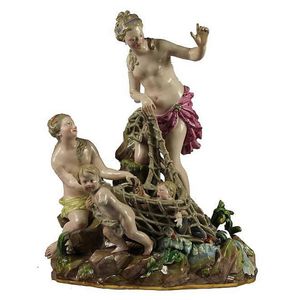"The Capture of the Tritons" Figure Group
You must be a subscriber, and be logged in to view price and dealer details.
Subscribe Now to view actual auction price for this item
When you subscribe, you have the option of setting the currency in which to display prices to $Au, $US, $NZ or Stg.
- Aphrodite / Venus - In Greek mythology, Aphrodite is the goddess of love, desire and beauty, whilst in Roman mythology she is called Venus.
- Cupid Motif - The Cupid motif, which features the Roman god of love and desire, Cupid, was a popular decorative element in classical ornamentation. Cupid was often depicted as a winged, naked baby with a bow and arrow, and was often used to symbolize love and desire.
In classical art and architecture, Cupid motifs were often used as decorative elements on furniture, such as on the legs of chairs and tables, as well as on architectural elements such as friezes and pediments. They were also used as decorative elements in frescoes, mosaics, and other forms of art.
During the Renaissance, Cupid motifs were often incorporated into the decoration of palaces, churches and other grand buildings, as they were seen as symbols of love and fertility. Cupid motifs were also commonly used in the decorative arts of the Baroque period, often appearing in the form of putti, which are small winged cherub figures.
In addition to their decorative use, Cupid motifs were also believed to hold symbolic meaning, as they were thought to evoke feelings of love, desire, and fertility.
This item has been included into following indexes:
Visually similar items

A Continental terracotta figure of a maiden holding a dove. Signed 'Carrier Bellouse'. 60 cm high.

Meissen 19th century figure group with a lady & cupid with attending figures to the rocky base, probably modelled after Acier, some damage & restorations. Height 30 cm

A monumental composite statue depicting a warrior slaying a lion 20th century, 225 cm high

A Royal Dux figure of a young girl with basket and a dog, 36 cm high
